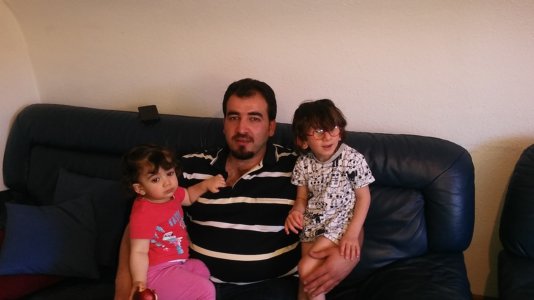- About
- Topics
- Picks
- Audio
- Story
- In-Depth
- Opinion
- News
- Donate
- Signup for our newsletterOur Editors' Best Picks.Send
Read, Debate: Engage.
| May 28, 2020 | |
|---|---|
| topic: | Refugees and Asylum |
| tags: | #asylum seekers, #EU, #Europe, #migration, #refugees, #Syria |
| located: | Syria, Lebanon, Turkey, Greece, Macedonia, The former Yugoslav Republic of, Serbia, Belgium, Germany, Austria |
| by: | Frank Odenthal |
FairPlanet: What was the situation like at home in Syria before you fled?
Luay Mansour: I‘m from Ar-Raqqa, and I moved to Aleppo to study. I studied economics there during the day and then worked in a restaurant in the evening. The government had offered us a house to buy in Ar-Raqqa, but we ignored that. I just didn't want to buy a house from the government. When DAESH (Islamic State) came, I decided to flee.
How was it to be on the run? What happened on the way?
I went on my own, my wife stayed in Aleppo with our son. That was in 2015. First I went to Beirut in Lebanon, and from there I took a plane to Turkey, to Istanbul. I stayed there for six months, worked as hard as I could, but I couldn't make enough money there to make ends meet and support my family at home. So I decided to go on towards Western Europe. I went down to Izmir together with some friends who also wanted to go to Europe. So I took a ferry from Izmir to Athens, and from there I continued by bus through Northern Macedonia and then to Serbia. In Serbia we had to walk, and we slept on the streets.
Was there any support on the way through the Balkans? Or have you been threatened by anyone?
We were accompanied by the police all across Serbia and through the other Balkan countries. But there were no threats. They just wanted us to get through their countries as quickly as possible. That‘s how I made it to Austria.
Was it your goal right from the start to come to Germany?
No, I actually wanted to go to Brussels in Belgium because I have relatives there. In Vienna I bought a train ticket to Brussels, but unfortunately I only got as far as the German border. All refugees had to get off the train there.
How did things continue in Germany?
The refugees were spread all over Germany. I was brought to the city of Mannheim. I had to stay there for three months. There was no financial support for me there. Only later, when I was relocated to the Freiburg area in the south-west of Germany, did Caritas take care of me. They made sure that I was supported financially. Through Caritas I came into contact with a family in Kollnau, a district of Waldkirch, who kindly offered me and my family a place to stay. Later I was able to rent a small apartment in the centre of Waldkirch, where we still live today.
My wife and my now five-year-old son are with me now since 2017, and our daughter was born here in 2018.
That sounds positive indeed.
That‘s right. And in 2017 I was able to start an apprenticeship as a cook in quite a sophisticated restaurant in Waldkirch. The final exam was supposed to take place this Spring, but it was canceled due to the corona pandemic. Hopefully I can catch up soon.
What was the biggest problem for you when you arrived in Germany?
And for your wife, Goufran?
Goufran Mansour: The language.
Luay Mansour: Unfortunately my wife still speaks very little German. You know, our son has a genetic defect, he's mentally disabled. It is difficult for my wife, she has to look after him all around the clock. And when I‘m at work, she‘s completely on her own. Therefore, she has little contact with other people and has little opportunity to learn the language. So at some point I would like to reduce my workload to support her so that she can finally make contacts and catch up the language.
Do you still have support today, for example in dealing with the authorities, with doctors, etc.?
When we lived in Kollnau, the family who provided us with the apartment helped us tremendously in dealing with the authorities, doctors, and looking for a kindergarten place for our son. And Caritas also continues to take care of us.
What are your hopes and wishes for the future?
Luay Mansour: I would like to work as a cook after my training period to support my family.
Goufran Mansour: I wish that we can all live a happy life in Germany.
Do you sometimes think of Syria, your hometown?
Yes, I do. Every day.
Luay and Goufran Mansour, thank you very much for this interview.
By copying the embed code below, you agree to adhere to our republishing guidelines.


